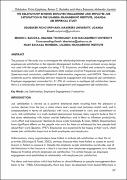| dc.contributor.author | Picho, Epiphany Odubuker | |
| dc.contributor.author | Basheka, C. Benon | |
| dc.contributor.author | Muhenda, Mary Basaasa | |
| dc.date.accessioned | 2018-05-30T12:49:20Z | |
| dc.date.available | 2018-05-30T12:49:20Z | |
| dc.date.issued | 2013 | |
| dc.identifier.citation | Epiphany, O. P., Basheka, B. C., & Muhenda, M. B. (2013). The Relationship between Employee Engagement and Employee Job Satisfaction in the Uganda Management Institute, Uganda: An Empirical Study. Journal of Business and Public Dynamics for Development, 1(1), 57–73. | en_US |
| dc.identifier.issn | 23059338 | |
| dc.identifier.uri | http://dir.muni.ac.ug/xmlui/handle/123456789/33 | |
| dc.description.abstract | The purpose of the study was to investigate the relationship between employee engagement and employee job satisfaction in the Uganda Management Institute. A cross-sectional survey design was used with the target sample size being 118. Purposive, stratified and systematic sampling techniques were used to select respondents. Data analysis involved frequencies and percentages, Spearman rank correlation, coefficient of determination, regression, and ANOVA. There was a moderate positive relationship between employee engagement and employee job satisfaction. Employee engagement accounted for 21.3% of variance in employee job satisfaction; hence there is a relationship between employee engagement and engagement job satisfaction. | en_US |
| dc.language.iso | en | en_US |
| dc.publisher | Journal of Business and Public Dynamics for Development | en_US |
| dc.relation.ispartofseries | Vol.1;No.1 | |
| dc.subject | Job Satisfaction | en_US |
| dc.subject | Employee Engagement | en_US |
| dc.subject | Productivity | en_US |
| dc.title | The Relationship between Employee Engagement and Employee Job Satisfaction in the Uganda Management Institute, Uganda: An Empirical Study | en_US |
| dc.type | Article | en_US |

